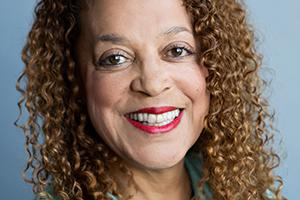Communications
'My Value Has Only Increased' Says MA Student

Kimberly Reason is a strategic communications professional with over 20 years experience working for the Central Puget Sound Regional Transit Authority, the city of Seattle, Macy’s, and more. She is currently enrolled in SOC’s Masters Strategic Communication Online program. The program allows students a flexible way to bolster their strategic communications career and learn from SOC’s award winning faculty. She spoke to SOC about her experience in the program.
School of Communication: You have an extensive career as a strategic communications executive. What made you decide to pursue your masters in strategic communication?
Kimberly Reason: I've always relished academic learning, and earning a Master's degree has remained a top life goal of mine. But the unrelenting demands of executive management in the nonprofit and corporate sectors precluded me from pursuing a graduate education earlier in my career. When Macy's closed its regional corporate offices some years ago, I took time off to figure out what I wanted to do next. I realized that I had enjoyed media relations, and when the opportunity to serve as spokeswoman for a high-profile public agency presented itself, I took it.
Initially, I found my role wonderfully stimulating. Over time, though, I felt myself stagnating. I had learned all I could on the job, and came to realize that I would not find the intellectual challenge I was hungry for in my work environment. I'd have to stretch myself beyond the limits of my position to pursue meaningful growth opportunities.
I could also see that the communications industry was rapidly changing. I wanted to keep up with those changes. Finally, I had encountered marketing-leaning people who had no public relations background, but who nonetheless sought to influence high-risk PR decisions. I considered it crucial for me to reinforce my professional experience with the theoretical and scholarly underpinnings of the PR industry to counter poor decision-making.
SOC: Why did you choose to pursue the online program and what advantages have you found through taking your degree online?
KR: I had briefly considered on-campus and hybrid programs; I'd even taken a local on-campus literary fiction certificate course a few years ago. But the horrendous commute time in standstill traffic was a major barrier for me. I also was frustrated by one or two students who dominated classroom discussions and sometimes veered the teacher off the lesson plan. Since I am an independent and self-disciplined person, I instinctively knew that online learning would fit my learning style best. I enjoy studying in my home office or being able to open my laptop and study remotely if I am out of town. I also enjoy studying at whatever hours I choose, whether that means staying up late or rising early.
SOC: What have been the most valuable parts of the online MA in strategic communication to you so far? Are there any courses or professors who stand out?
KR: I've found all the classes fun, robust and valuable. Professorial Lecturer (Christie) Parell's Principles of Strategic Communication class was the perfect start to the program; she was super clear, thorough and concise in her instructions. She also did a great job summarizing the week's learnings in podcasts.
I was surprised by how much I enjoyed Assistant Professor Scott Talan's Social Media Strategies and Tactics class, since my grounding is primarily in earned media. I had a great time creating digital campaign plans, graphics and GIFs, and conducting a SWOT analysis. Plus, Professor Talan, as with all the MASC professors, remained highly communicative throughout the course.
My biggest surprise was Adjunct Associate Professor John Powers' Research for Strategic Communication course. This was the most difficult class. The reading was very technical and dense, and the activities, assignments and quizzes mercilessly tested my knowledge. I studied like a fiend! Professor Powers remained engaged the entire time, responding to questions within 24 hours or less; giving candid feedback; and maintaining a terrific sense of humor throughout.
SOC: What advice would you have for mid-career professionals considering diving back into education?
KR: I'd say do it! Especially if your organization offers any form of tuition reimbursement. Though I have a year to go before I complete the MASC program, I'm already reaping its benefits. For example, I've incorporated course learnings, such as using communications research principles and methodologies to help build a rider survey on equitable fares enforcement, into my current role (I've been promoted to Deputy Chief of Staff since starting the program last fall). I've been able to problem-solve complex issues that require a deeper understanding of communication principles and practices. My ability to offer well-informed solutions, and advocate effectively for alternative courses of action, has helped the executives with whom I work communicate more effectively and make positive, lasting impressions. My value has only increased -- I look forward to the rest of the program!
